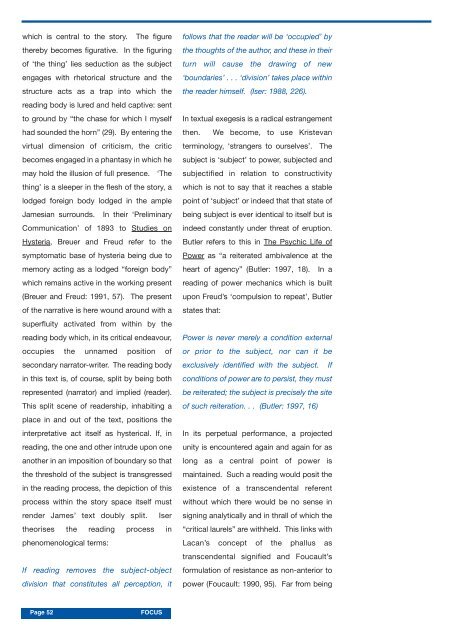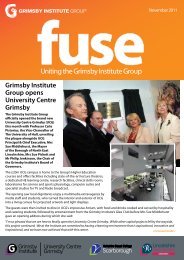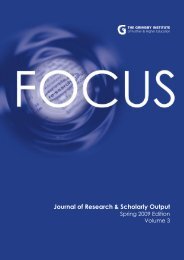Journal of Research & Scholarly Output 2006 - Grimsby Institute of ...
Journal of Research & Scholarly Output 2006 - Grimsby Institute of ...
Journal of Research & Scholarly Output 2006 - Grimsby Institute of ...
You also want an ePaper? Increase the reach of your titles
YUMPU automatically turns print PDFs into web optimized ePapers that Google loves.
which is central to the story. The figure<br />
thereby becomes figurative. In the figuring<br />
<strong>of</strong> ‘the thing’ lies seduction as the subject<br />
engages with rhetorical structure and the<br />
structure acts as a trap into which the<br />
reading body is lured and held captive: sent<br />
to ground by “the chase for which I myself<br />
had sounded the horn” (29). By entering the<br />
virtual dimension <strong>of</strong> criticism, the critic<br />
becomes engaged in a phantasy in which he<br />
may hold the illusion <strong>of</strong> full presence. ‘The<br />
thing’ is a sleeper in the flesh <strong>of</strong> the story, a<br />
lodged foreign body lodged in the ample<br />
Jamesian surrounds. In their ‘Preliminary<br />
Communication’ <strong>of</strong> 1893 to Studies on<br />
Hysteria, Breuer and Freud refer to the<br />
symptomatic base <strong>of</strong> hysteria being due to<br />
memory acting as a lodged “foreign body”<br />
which remains active in the working present<br />
(Breuer and Freud: 1991, 57). The present<br />
<strong>of</strong> the narrative is here wound around with a<br />
superfluity activated from within by the<br />
reading body which, in its critical endeavour,<br />
occupies the unnamed position <strong>of</strong><br />
secondary narrator-writer. The reading body<br />
in this text is, <strong>of</strong> course, split by being both<br />
represented (narrator) and implied (reader).<br />
This split scene <strong>of</strong> readership, inhabiting a<br />
place in and out <strong>of</strong> the text, positions the<br />
interpretative act itself as hysterical. If, in<br />
reading, the one and other intrude upon one<br />
another in an imposition <strong>of</strong> boundary so that<br />
the threshold <strong>of</strong> the subject is transgressed<br />
in the reading process, the depiction <strong>of</strong> this<br />
process within the story space itself must<br />
render James’ text doubly split. Iser<br />
theorises the reading process in<br />
phenomenological terms:<br />
If reading removes the subject-object<br />
division that constitutes all perception, it<br />
follows that the reader will be ‘occupied’ by<br />
the thoughts <strong>of</strong> the author, and these in their<br />
turn will cause the drawing <strong>of</strong> new<br />
‘boundaries’ . . . ‘division’ takes place within<br />
the reader himself. (Iser: 1988, 226).<br />
In textual exegesis is a radical estrangement<br />
then. We become, to use Kristevan<br />
terminology, ‘strangers to ourselves’. The<br />
subject is ‘subject’ to power, subjected and<br />
subjectified in relation to constructivity<br />
which is not to say that it reaches a stable<br />
point <strong>of</strong> ‘subject’ or indeed that that state <strong>of</strong><br />
being subject is ever identical to itself but is<br />
indeed constantly under threat <strong>of</strong> eruption.<br />
Butler refers to this in The Psychic Life <strong>of</strong><br />
Power as “a reiterated ambivalence at the<br />
heart <strong>of</strong> agency” (Butler: 1997, 18). In a<br />
reading <strong>of</strong> power mechanics which is built<br />
upon Freud’s ‘compulsion to repeat’, Butler<br />
states that:<br />
Power is never merely a condition external<br />
or prior to the subject, nor can it be<br />
exclusively identified with the subject. If<br />
conditions <strong>of</strong> power are to persist, they must<br />
be reiterated; the subject is precisely the site<br />
<strong>of</strong> such reiteration. . . (Butler: 1997, 16)<br />
In its perpetual performance, a projected<br />
unity is encountered again and again for as<br />
long as a central point <strong>of</strong> power is<br />
maintained. Such a reading would posit the<br />
existence <strong>of</strong> a transcendental referent<br />
without which there would be no sense in<br />
signing analytically and in thrall <strong>of</strong> which the<br />
“critical laurels” are withheld. This links with<br />
Lacan’s concept <strong>of</strong> the phallus as<br />
transcendental signified and Foucault’s<br />
formulation <strong>of</strong> resistance as non-anterior to<br />
power (Foucault: 1990, 95). Far from being<br />
Page 52<br />
FOCUS

















